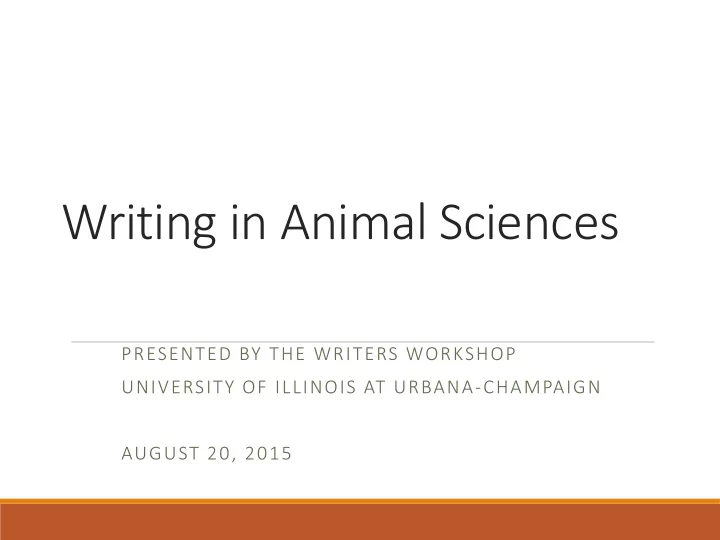

Writing in Animal Sciences PRESENTED BY THE WRITERS WORKSHOP UNIVERSITY OF ILLINOIS AT URBANA-CHAMPAIGN AUGUST 20, 2015
Overview Writers Workshop resources Writing as a process Writing Tips ◦ Thesis & Journal articles ◦ Common Issues in Science & Technical Writing ◦ Fellowships & Grants
Writers Workshop The Writers Workshop is a free service available to all students at any stage of the writing process. We are also available for to visit your class to offer general information or help with a particular writing task. Website: http://www.cws.illinois.edu/workshop/ Email: wow@illinois.edu Phone: 271-333-8796 Maximum of 2 appointments/week, 10/semester
Writing as Process Ongoing and recursive process of generating ideas, outlining, drafting, revising, talking, sharing, reading more things, revising again, drafting, etc. Give yourself enough TIME for this process: set and stick to deadlines.
Revising, Editing, and Proofreading Revising means re + vision = looking at it again. We are always in the process of revision. Editing at paragraph and sentence level: clarity and concision. Proofreading: Pane of glass metaphor. If there are scratches and smudges on the surface, your reader will be distracted and won’t be able to see all of the smart content underneath. Formatting: Refer to assignment/prompt/journal guidelines
Writing Tips LONG PROJECTS: JOURNAL ARTICLES AND THESIS/DISSERTATION
Think marathon, not sprint Set aside time on your calendar (ideally at least 1 hour every day) and stick to it – as though it is an important meeting Have clear, specific, manageable daily goals: “Tomorrow I am going to write three paragraphs of the results section dealing with XYZ finding.”
Literature Review Joining a conversation among people interested in your area/field Sources tell you how that conversation has gone so far and what the controversies are Literature reviews are not book reports! Position your work in relationship to what others have done
Paragraphs & Transitions Paragraphs: Built around one main idea Transitions: Let your reader know that you are moving from one point to another ◦ Phrases and logical relationships: In addition, however, although, therefore, moreover
Common Problems in Science & Technical Writing *adapted from A. Pincus, Ph.D., 2014
Subject/Verb separation WHEN YOUR SUBJECT AND VERB ARE SEPARATED BY A LOT OF OTHER WORDS
Original: The possibility that some termini have a base composition different from that of DNA simply because they are the nearest neighbors of termini specifically recognized by the enzymes can be checked by comparing the experimental results with those expected from the nearest neighbor data. Revision: If we compare the experimental results with those expected from the nearest neighbor data, we can check the possibility that some termini have a base composition different from that of DNA simply because they are the nearest neighbors of termini specifically recognized by the enzymes.
Overabundance of nominalizations NOMINALIZATIONS = VERB-LIKE WORDS, VERBS TURNED INTO NOUNS (*ING, *TION)
Original: The assumption that all RNAs are poly-adenylated is an oversimplification of the transcription process. Revision: The model oversimplifies the transcription process because it assumes that all RNAs are polyadenylated. Nominalizations force writers to rely on “to be” as a primary verb (which is weak) and create wordiness
Excessive Passive Voice OFTEN PREFERRED (DEPENDING ON DISCIPLINE) BUT NOT ALWAYS NECESSARY
• Passive voice is neither inherently scientific nor more objective than active voice • Consider cohesion: Don’t choose passive voice simply out of habit. Do choose passive voice when it improves cohesion by putting familiar ideas first. • Many scientific journals—and whole disciplines—encourage authors to use active voice for the sake of clarity , concision , and cohesion
“But using active voice means using first person pronouns, and first person pronouns aren’t allowed in my field!” The Standard Objection
Compare: The substrate surface was mapped using an Atomic Force Microscope. With: We mapped the substrate surface using an AFM. Or: The AFM mapped the substrate surface. Avoiding first person does not mean you can only use passive voice.
Five ways to improve clarity, concision, and cohesion 1. Omit unnecessary words Find and eliminate empty and/or excess modifiers (really/very, unique, important, etc.) or overly complicated language 2. Put actions in verbs (avoid nominalizations) Count the number of verbs/verb-like words in a sentence: 1-3 is ideal, more than that indicates the sentence is either too long, too wordy, too complex, or all of the above. 3. Place verbs near subjects/modifiers next to the thing they modify 4. Make the subject a technology, technique, or other object/process and put it in active voice 5. Put familiar information first/new or important information last
Writing Tips FELLOWSHIP AND GRANT APPLICATIONS
Know Your Audience Read the fellowship description closely Follow instructions exactly – page/word count, formatting, sections to include, specific information about what you will DO with this money Know who your readers will be: Experts in your field? Generalists? Interdisciplinary? Government, industry, scholarly, etc.
Additional Resources Graduate College Fellowship Office: http://www.grad.illinois.edu/fellowship s/about - Fellowship database - Workshops - 1:1 assistance
Further Resources Writer’s Workshop: ◦ http://www.cws.illinois.edu/workshop/ ◦ See “Writer Resources” page ◦ Call 217-333-3251 to make an appointment with a consultant Purdue Online Writing Lab (OWL): ◦ https://owl.english.purdue.edu/owl/ ◦ General and specific information for science writing
Recommend
More recommend